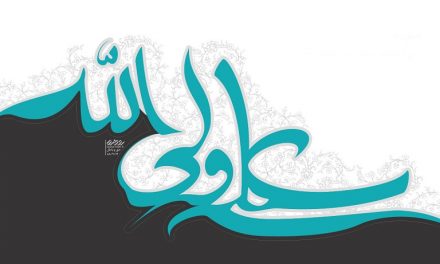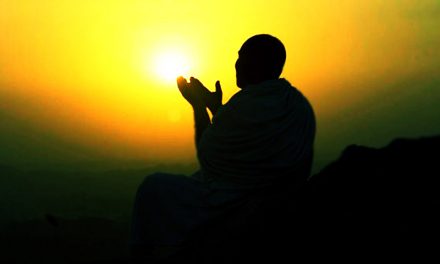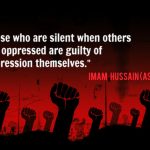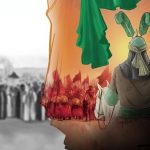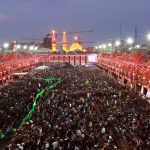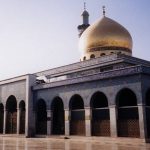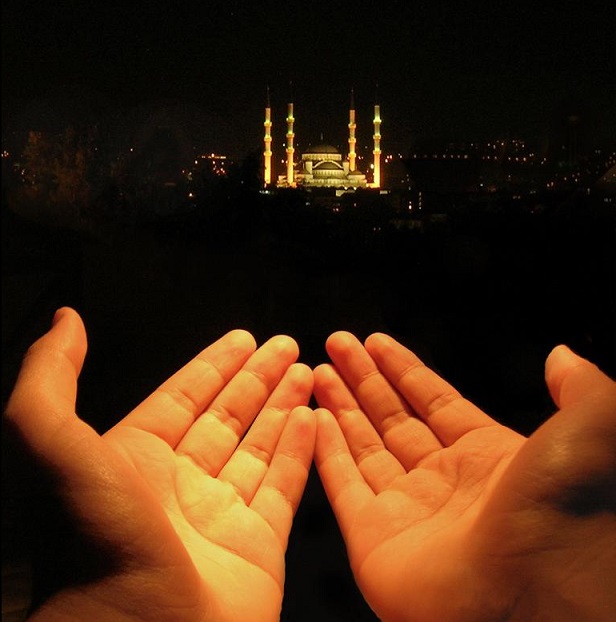
Takfir of Shia for Tawassul
Ibn Taymiyyah, despite his extreme and biased approach for prohibiting tawassul, has admitted, this is a controversial issue and to accuse of heresy those who make tawassul is haram and is a sinful act, since no one has said that a person making tawassul to the Prophet (PBUH) after his death is a kafir.
This is an ambiguous issue and there are no certain proofs in this regard. Kufr is confirmed when a person rejects any of the tenets of faith deliberately and being fully aware. Therefore, those who accuse a person of heresy for making Tawassul deserve the most severe punishment.
It is unfortunate that the blind prejudice which the colonial powers had skillfully exploited to create differences among Sunni Muslims as a result of the Wahhabiyyah opposition to the issue of tawassul, has been widened to sow discord between Sunni and Shia Muslims and to label the Shia as kafir (infidel) or mushrik (polytheist) on the allegation that they seek their requests from other than God.
To quote Ayatullah Wa’iz-Zadeh, those who do not permit tawassul and tabarruk are only a fraction of a minority among the ‘ulama’ of the Muslim world, and despite their efforts over the past seven centuries, have not been able to convince the upholders of tawassul.
Thus, as should be clear, according to the statement of Ibn Taymiyyah the issue of Tawassul is a moral one and does not concern the principles of faith, since a kafir is the one who rejects any of the tenets of Islam.
Extreme Form of Tawassul among the Ahl al-Sunnah
It is a common sight in many countries to see the Ahl al-Sunnah approaches the graves of pious persons to pray and supplicate for their needs. In Egypt, Iraq and Turkey, and many other lands India, Pakistan, Syria, Central Asia, North Africa it is an accepted practice by the masses to visit the tombs of saints and holy personages to make Tawassul and seek blessings.
Dr. Mustafa Mahmud writes that people in Egypt flock to the tomb of Rifa’i and Ibrahim Dasuqi and cry loudly with such phrases as Madad Ya Rifa’i (help me O Rifa’i), Shifa’ bi-Yadika Ya Sayyidi Ibrahim Dasuqi (In your hands lie the remedy, O my Lord Ibrahim Dasuqi).
The Egyptians also visit the tomb of Shafi’i, the founder of the Shafi’ite sect, for Tawassul, while in Baghdad; the Hanafis do the same at the tomb of Abu Hanifah. In Turkey, the people seek their needs at the tomb of the Prophet’s eminent companion Abu Ayyub Ansari.
It is also a habit among people in Egypt and other places to send written petitions to the tomb of Shafi’i, and wail and cry at the graves of pious persons for things which none except the Almighty God has the power to grant. When Wahhabi ‘ulama’ come across such scenes among the Ahl-ul-Sunnah they brand these Muslims as polytheists and follow the same assumption against the Shia, concerning whom they have little or no information, and sometimes go to extreme by labelling them apostates who should be killed.
Purity of Monotheism in Shia Supplications
The prayers and acts of worship among the Shia have the purest form of monotheism derived from the guidelines of Prophet Muhammad (PBUH) and the Ahl-ul-Bayt (AS). For instance, Shia do not put their forehead during prostration on carpet, cloth, plastic or synthetic material.
Since Imam Jafar al-sadiq (AS) has said, Worldly people are slaves of victuals and clothing; hence it is not right for a person who is in the act of offering his prayer to Allah to place his forehead on the deity of the worshippers of the world.
Likewise, Shia Muslims recite the supplications taught by the Prophet (PBUH) and his Ahl-ul-Bayt (AS) in which all requests are directed to Almighty Allah. The Infallible Imams (AS) have also dissuaded people from being distracted by external appearances and losing sight of the reality and substance of the supplications.
Shi’ah ‘ulama’ have strived to preserve the path of the Prophet (PBUH) and his Ahl- ul-Bayt (AS). Grand Ayatullah Sayyid Hussein Burujirdi was averse to prostration being made on a clay tablet having the outlines of a dome or structure.
In their jurisprudential manuals, both Ayatullah Burujirdi and Sayyid Khumayni have the following to say concerning prostration at holy shrines, it is haram to prostrate to anyone except Allah. If the act of prostration in front of the shrines of the Infallible Imams (AS) is a form of thanksgiving to God, there is no objection, otherwise it is haram.
A Glance at the Supplications of the Ahl-ul-Bayt (AS)
As acknowledged by the prominent Sunni scholar Mahmud Alusi in his exegesis on the Holy Qur’an, in none of the supplications that have been taught by the Ahl -ul-Bayt (AS), there is Tawassul to the person of the Prophet (PBUH)
If we go through the books of supplications of the Shia such as Mafatih al-Jinan, we find that all supplications of the Infallible Imams (AS) are directed solely at God, and all addresses begin with Allahumma, Ya Allah, Ya Rabb, and other attributes of God such as Ya Rahman, Ya Rahim, Ya Dhu al-Jalal wa al-Ikram, etc.
Seyyed Muhammad Hassan Musawi, writing on the famous Du’a’ Tawassul which is directed at the Prophet (PBUH) and the Infallible Imams (AS), says The purpose of Tawassul to the pious believers is that they are being requested to supplicate to Allah to deliver the person in need from his affliction, since the supplication of these saintly figures is accepted by Allah.
The Dua’a Tawassul which is found in Mafatih al-Jinan is the same supplication of tawassul which all Sunni narrators of hadith unanimously regard as sahih (authentic) and relate that the Prophet taught it to a blind man who recovered his eyesight by reciting it.
Conclusion
Therefore, in conclusion we can state with authority the following points, since Tawassul is an accepted principle in the life of a sincere and God fearing Muslim, and whatever disputes that have been fanned are due to bigotry and lack of proper understanding of Islam.
- Controversy over the issue of Tawassul is not a matter of discord between Shia and Sunni Muslims, but it is a difference of opinion between the Salafiyyah sect and the rest of Muslims.
2.Most of the differences of the Salafiyyah Wahhabis are with the extremist Sufis who believe in reincarnation, and with the Sunni masses who often make emotional tawassul at graves and seek their needs from the departed such as Abu Hanifah (and ‘Abd al-Qadir Gilani) in Baghdad, Shafi’i, Rifa’i, Dasuqi and others in Egypt, Idris in Morocco and Abu Ayyub Ansari in Turkey – as well as Khawajah Mu’in al-Din Chishti and numerous others in India, and Data Ganj Bakhsh and Sufi saints in Pakistan.
- In fact, the Salafiyyah and the Wahhabis have the least differences with Shia Muslims since Shia recite the supplications of the Ahl-ul-Bayt (AS) which contain the purest form of monotheism. However, because of their non-familiarity with the Shia they accuse them of polytheism and in their ignorance brand them infidels.
- In all the supplications of the Ahl-ul-Bayt (AS) the addressee is Almighty Allah alone, even in the famous Dua’a Tawassul, which the Sunnis say with unanimity was taught by Prophet Muhammad (PBUH) to a blind person who subsequently regained his eyesight.
- Du’a’ tawassul, where devotion is expressed to the Prophet (PBUH) and his Infallible Ahl-ul-Bayt (AS), is not exclusively meant for the Shia but was widely popular among the Sunnis until Ibn Taymiyyah and later Ibn ‘Abd al-Wahhab came on the scene with their weird interpretation.
For instance, the poetical composition of tawassul to the 14 Infallibles found in the works of prominent poets of the Ahl al-Sunnah such as the Persian poet Shaykh Sa’di and the Sufi Khalid Naqhsbandi as well as the famous Spanish Muslim gnostic and philosopher Shaykh Muhyi al-Din Ibn al-‘Arabi.
- As part of their misinformation campaign against tawassul, the Salafiyyah attempt to exploit certain Ayahs of the Holy Qur’an which refer to the polytheists who worship idols instead of the One and Only God and who seek their wants from these lifeless man-made objects. However, it is clear that equating those who seek Tawassul to the Prophet (PBUH) with the polytheists and infidels is an erroneous idea, since Tawassul-seekers, unlike the idolators, address the Almighty Creator and seek their needs from Him by making the Prophet (PBUH) a wasilah for acceptance of prayer.
On the other hand, the idols have no connection with God and are nothing more than inanimate objects made by man, while Prophet Muhammad (PBUH) is the manifest sign of Allah, the Messenger of Allah and Mercy to the creation. Allah has also given him power, both in this world and in the next, to supplicate and intercede for his true followers. The Wahhabi contention of the period of Barzakh of the Prophet (PBUH) lacks any rational explanation and is against the view of the ‘ulama’ of all other sects of the Ahl al-Sunnah.
- Those who wish to make the Prophet (PBUH) the intercessor without being obedient to the Holy Qur’an and the Ahl-ul-Bayt (AS) have been likened by Shia ‘ulama’ such as ‘Allamah Tabataba’i, to a wishful person who wants to become the sage of the age without learning or studying anything.
Source: al-islam.org

